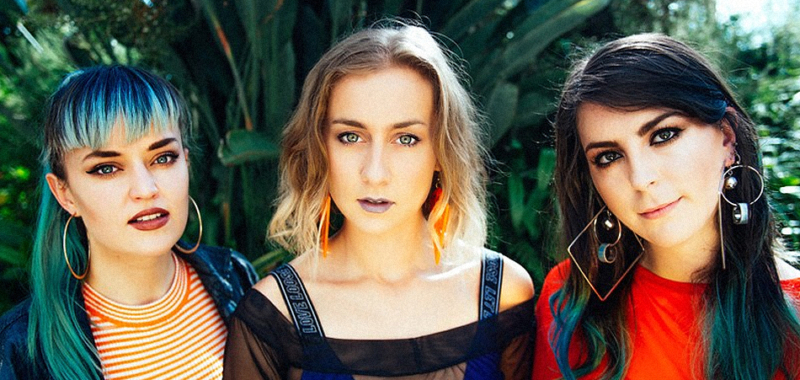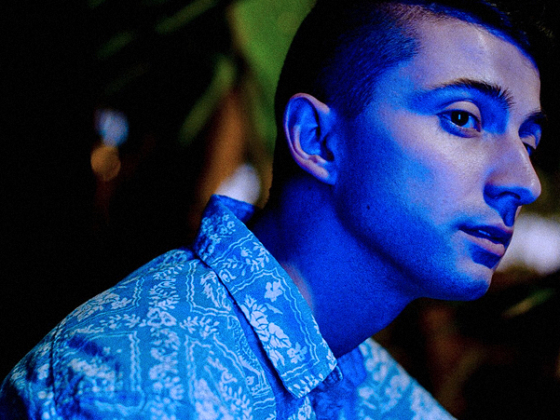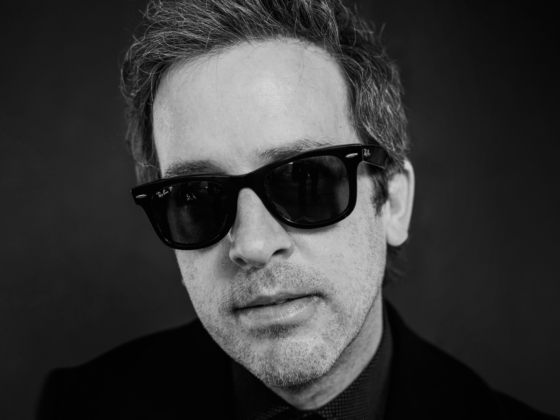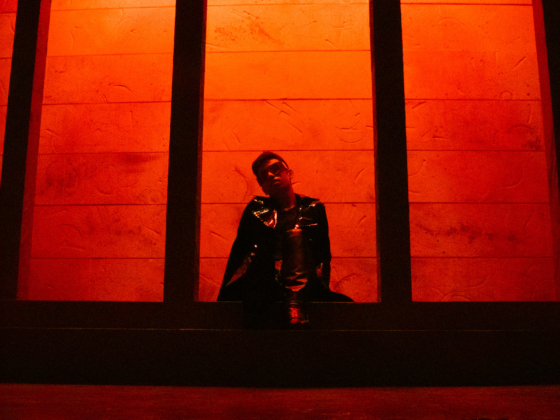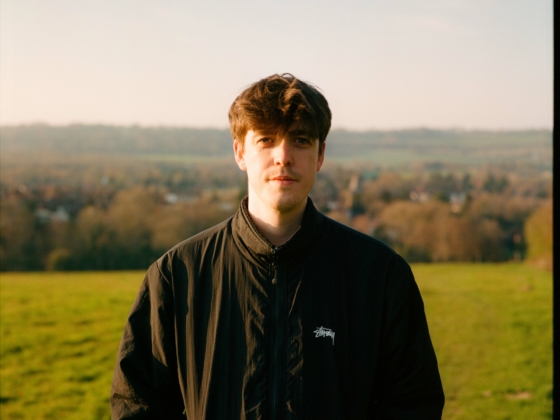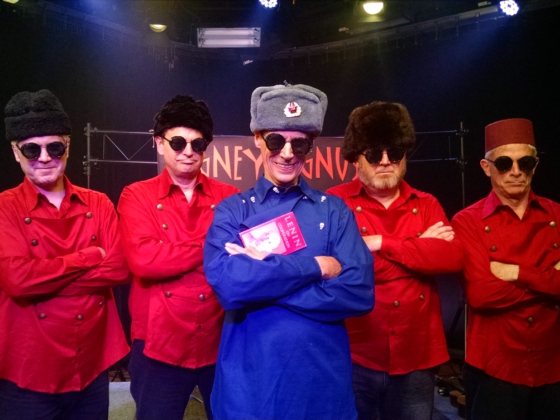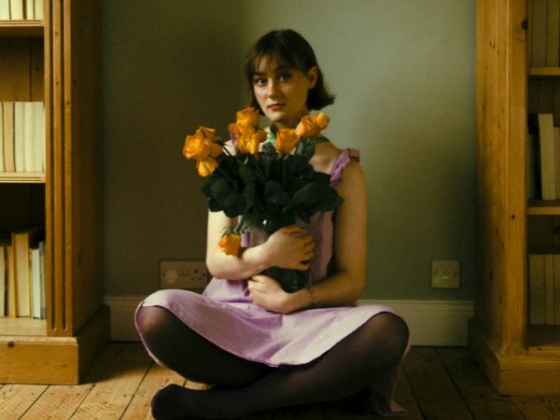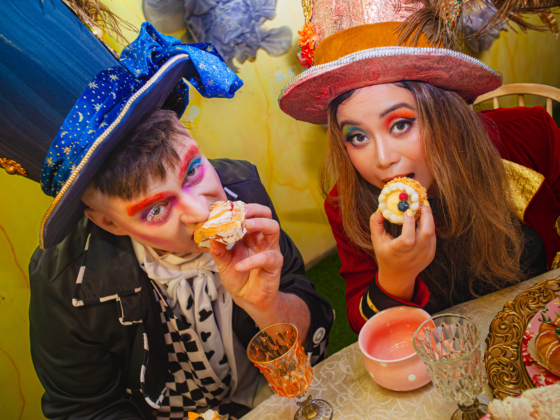Wyvern Lingo's debut album opens on a solitary note. It builds, slowly but surely, into three voices—the voices of band members Karen Cowley, Caoimhe Barry, and Saoirse Duane. It's not a harmony, nor is it entirely dissonant; it's a collection of sound. Each follows its own trajectory, until the vocals burst into a pulse; a heartbeat, if you will. This is a sonically stunning preface and sets pace for a debut album that breathes, and sings of life.
The sweet, smooth vocal harmony characteristic of the trio's earlier recordings is ever-present. On a cappella gems like "Used"—a track re-purposed from their debut EP The Widow Knows—the girl's voices absolutely soar. Listening to the two versions back-to-back, one can't help but notice that the version on the album doesn't shy away from silence; it leaves space in between sound as poignant as the lyrics. It echoes the breathing pattern of the rest of the album; a series of deep inhales and exhales, punctuated with intense pauses and sharp intakes of air. It would be an injustice to the whole group to single out one member's voice because the three girls move as a singular unit, entirely in sync even when singing solo, but the undeniable secret star of the album is Saoirse Duane's subdued guitar. Tracks like "Fountains," "Snow II," and "Maybe It's My Nature" are beautiful, yes, but also contain an underlying, irresistibly catchy groove, in keeping with the group's off-the-beaten-path R&B sound.
EARMILK talked influences, their LingoLand podcast, and creative process with vocalist Karen Cowley ahead of the debut. Lyrically rich, politically charged, and layered with lush instrumentation, the album will no doubt solidify Wyvern Lingo as one of Ireland's most exciting new acts. We recommend high volume, good speakers, and your undivided attention.
EARMILK: Can you walk me through the process of putting it all down? How do you decide what makes the final cut, and did you end up losing anything precious?
KAREN COWLEY: After the Letter to Willow EP, we were writing a lot. We wrote about three album's worth of songs, and I think it was a matter of just slimming down, and then eventually picking the songs that complimented each other. It became this mixture of really old songs which we felt deserved to be on this first output into the world and songs like "Out of My Hands" which we wrote in studio. We're always very prepared with demos and have pre-production finished, but that was one we just experimented with in studio. And we still have so many songs which maybe weren't right for this album but could fit on the next one.
EM: How do you split up the writing? Does one person write all of the lyrics or do you share?
KC: There's never really a rule because there are so many exceptions. I typically do lyrics and melody first, and then bring it to the girls and we rearrange it. Sometimes we throw in ideas with each other. We each have different patterns. I always think I'm only good at choruses and bridges, whereas Saoirse is way more of a producer—she'll come in with a fully produced track and no lyrics or melody. And Caoimhe is a weird mix of everything. "Rubbish" was a riff Saoirse had written and demoed and then Caoimhe wrote the lyrics afterward. We don't set out to split it up though. At the end of each song, we always credit all three of us.
EM: You re-vamped a couple of tracks—"Used" being one of them—off your previous EPs. Why did you feel like they needed a second shot?
KC: We've been in this band for so long…we've actually released a podcast today about "Snow II" where we talk about how we re-did the whole thing, and we've actually been stealing a motto from James Vincent McMorrow to explain it. He always says "I was limited by the tools I had at the time" and that is exactly how it was for us. We were figuring out our young adult life, and we were putting every bit of money we made from the band into recording on the weekends. We weren't experimenting with sound, we were just playing the instruments we had. A lot of thought went into it at the time but it was our first ever recording. It took a lot of practice to learn how to manipulate the recording process and take an idea that's in your head and communicate it to people the way you actually want it to sound. That's very difficult to do in early stages. Also, our voices have matured. We sound different. When you're putting every fifty euro into recording you don't have the luxury of experimenting that much. It happened quite slowly—a lot of people are saying "I Love You, Sadie" is such a departure, but really it's been coming for a long time.
EM: How did the three of you start singing together? How did you meet?
KC: I wish it was daylight, I could show you! Caoimhe grew up in the estate next to me, but we didn't know each other until we were eleven. Saoirse was in primary school with myself. I was always into music, and [the girls] were playing instruments so we figured we should start a band. When you're discovering bands at twelve and thirteen it's a really special time. We would just write songs, play music together, and it formed organically.
EM: I understand you all have band tattoos? What are they and what do they mean?
KC: You've been in Ireland a few times, have you ever heard anyone say "sure look?"
EM: All the time.
KC: Oh thank God, this is so hard to explain to people. "Sure look" just means like, "fuck it, grand." We would go through phases where we'd say it twenty times a day. We thought about getting a band tattoo for years, joking we'd get "sure look" but never did. And tattoos are expensive. We went to Great Escape in Brighton last year, and there was an announcement that they'd be doing free tattoos. Saoirse signed us up, and I was still of two minds about the whole thing because it would have been my first one. Then we played our gig outside on a bandstand, and there was this torrential rain. I rented a keyboard which didn't show up until five minutes before the gig. All these really stressful things happened, so once the gig was over (and we were soaked and the opposite of glamorous) it was tattoo time and I was like "I'm getting it." Every time I look at it, I laugh.
EM: There are a few of the songs on the album, specifically "I Love You, Sadie" and "Out of My Hands," and I wondered if you can speak a little further on why it's important to you all to engage with that stuff through your art?
KC: I will say that everything on the album comes from a sincere experience. We spend half of band practice talking about things—articles we've read and other world issues—and we're very outspoken. Because we're so close, we write these songs together as a way of processing events. For example, "I Love You, Sadie" is a love song. Caoimhe wrote it to the female alter-ego of her boyfriend. That song didn't start out to make any grand statement, but it incidentally does because it's about the futility of gender stereotypes. She did not sit down to write a song about gender stereotypes. I think sometimes if you sit down to write about an issue, a lot of the time it doesn't turn out great. "Out Of My Hands" is the most political track on the album. I wrote that song after meeting a guy at a pub who was on the edge of a demonstration criticizing it and being kind of obnoxious. Everyone is so opinionated and well-articulated online, but it's when you're face-to-face that really counts. I tried to level with him, and he was drunk and [it was] awful. That song was very much me trying to get into [this man's] skin. Sometimes it's even distant relatives who are echoing these kinds of opinions that can be quite dangerous. ["Out Of My Hands"] is a stream of consciousness about what I think he thinks. People were concerned, like "do you think those things?" I had to be like "no, it's a character." It's about political apathy, not wanting to see what's going on because we're so saturated with information. Sometimes I get it—like people don't want to see another bombing on Facebook. After I wrote it Caoimhe said he was creepily relatable. For me the best art is something that makes you stop and think in a way you haven't before. I particularly love songs that sound like one thing and actually mean another. I've been listening to Solange loads—you know her song "Mad"?—what a perfect example. The sweetest sounding 70's soul song and it's about being so angry. Paul Simon and Hozier are [other one's] who just dress up songs as one thing and they mean an entirely different thing. I have sat down and tried to write a song about the refugee crisis. And they've turned into bad songs. So it has to come from a moment or experience. I think the album as a whole is very much that. Whether it's about female sexuality or whatever else is incidental, it's just how we see the world. Some of it is very personal and some of it is a communal feeling.
EM: Talk to me about "Tell Him" – that's a song that made me pay attention, it's very relatable. I'm very curious about it.
KC: "Tell Him" is one of those songs that fell out of me. I remember the day I wrote it very clearly. I was sitting at the piano and I wrote the verse, took it to band practice to the girls and we sat and finished it. It's probably the most personal song on the album for me, but it's about how horrible it is when you have to disconnect a relationship whether it's romantic or not. You go from being so close to someone to having to pass last messages and it's a horrible place. My worry was that it would sound really harsh, but the truth is that's the whole point of the song. It's painful.
Wyvern Lingo's self-titled debut album is available everywhere on February 23rd via Rubyworks Records.

